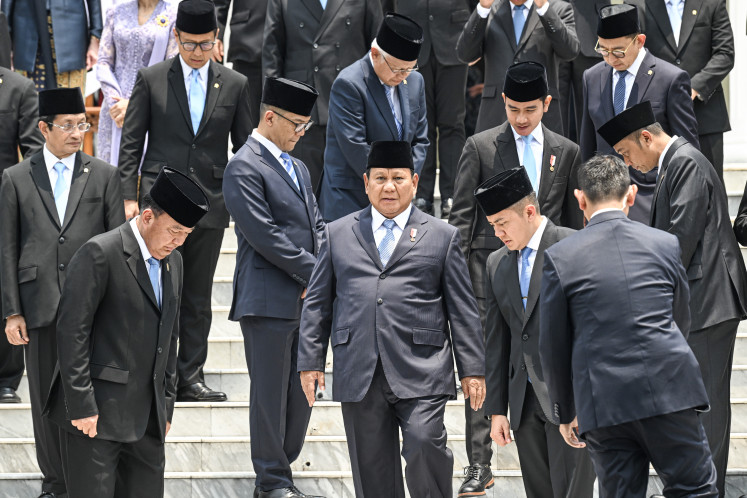Popular Reads
Top Results
Can't find what you're looking for?
View all search resultsPopular Reads
Top Results
Can't find what you're looking for?
View all search resultsRI shuts down U.S. medical laboratory
The U
Change text size
Gift Premium Articles
to Anyone
The U.S. Naval Medical Research Unit number 2 (Namru-2) laboratory in Jakarta will be temporarily shut down because it offers "little benefit" to Indonesia, Health Minister Siti Fadilah Supari said Thursday.
"They are not allowed to conduct any activities anymore. The term is suspension, but there are no activities at all now," she was quoted as saying by Reuters.
Siti, Indonesia's senior-most medical official, said she staunchly opposed the medical lab and called for its closure, arguing that it did not benefit national interests and even compromised national security.
Siti said the lab refused to share all of its findings with the host country.
Indonesia and the U.S. ceased negotiations on the future of the lab in June after officials and legislators proved unable to agree whether the lab, active since 1970, should continue its operations in Indonesia.
The Indonesian Foreign Ministry said the temporary closure of the lab was not contentious as negotiations between the two sides were ongoing.
"As long as we are still negotiating a new umbrella agreement for Namru, the termination of activities is no problem," Foreign Ministry spokesman Teuku Faizasyah told The Jakarta Post by phone from New York.
The halt in activities does not mean the lab will be closed permanently as the contract with Washington to operate the lab has not yet terminated, another Indonesian Foreign Ministry official said.
"We still have a contract. Although it was terminated in 2000, then President Abdurahman Wahid revived it," ministry director general for relations with America and Europe Retno P. Marsudi said.
The U.S. and Indonesia have yet to resume talks since the June negotiations breakdown, she said.
The negotiations were complicated by an international dispute over how to share crucial bird flu samples.
U.S. Health and Human Services Secretary Michael Leavitt has said the quarrel over Indonesia's refusal to share its samples of the H5N1 avian influenza virus with the rest of the world has spilled into the Namru talks.
Siti earlier forbid samples of the virus to be shipped outside of Indonesia, citing that rich nations and pharmaceutical companies would benefit by using the samples to develop vaccines that poor countries would not be able to afford.
Many international observers have said Namru is central to Indonesia's early efforts to track mutations of H5N1, which is feared may become transmissible among humans with the potential for it to sweep the world in months and kill millions.
Indonesia has suffered 112 deaths from the virus, making it the country with the highest death toll.










